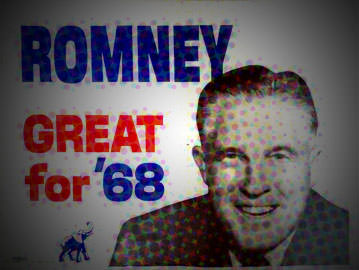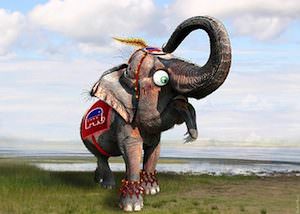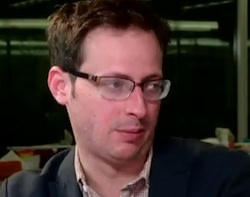GOP Ghosts in Tampa
In 1964, George Romney, then the governor of Michigan, walked out of the Republican National Convention during Barry Goldwater's acceptance speech. He was protesting his party's sharp turn rightward and its weak platform plank on civil rights.
TAMPA, Fla. — In 1964, George Romney, then the governor of Michigan, walked out of the Republican National Convention during Barry Goldwater’s acceptance speech. He was protesting his party’s sharp turn rightward and its weak platform plank on civil rights.
This week, 48 years on, Mitt Romney is set to achieve what his father never could. But this great family triumph will not represent a vindication of his father’s principles. Mitt Romney reached the summit not by battling the GOP’s staunchest conservatives but by accommodating them. Nothing better captures the absolute victory of the forces of Goldwaterism than a Romney triumph on the basis of Goldwater’s ideas.
There will certainly be no speeches akin to the one offered by Nelson Rockefeller, the champion of liberal Republicanism. He was booed and hissed by the Goldwater legions who dominated the 1964 gathering.
Scorning the militants of a new right, Rockefeller pronounced their views “wholly alien to the sound and honest conservatism that has firmly based the Republican Party in the best of a century’s traditions, wholly alien to the sound and honest Republican liberalism that has kept the party abreast of human needs in a changing world, wholly alien to the broad middle course that accommodates the mainstream of Republican principles.”
Liberalism cannot speak its name at a Republican convention anymore. And the contemporary figure closest to the liberal Republicanism of old may well be a man named Barack Obama.
Nowhere is it written that a son must follow his father’s political creed, and the times that shaped Mitt Romney were very different from the post-World War II era of social solidarity that set George Romney on his course in business and politics. The capitalism of Bain is not the capitalism of the auto industry during the ’50s and ’60s in which the elder Romney made his mark.
And to get to the top of a far more conservative GOP, Mitt Romney had to make his peace with the tea party, the Christian Coalition, the Club for Growth and all the other forces that have produced the most radically individualistic brand of politics our country has seen since the Gilded Age.
Romney sealed this pact by choosing to run with Paul Ryan, the one-time devotee of Ayn Rand’s self-regarding philosophy. Thus will this election be as large in its implications as Goldwater’s was — but against an incumbent presiding over an economy far less carefree than the booming prosperity machine that helped Lyndon B. Johnson to his landslide and liberalism to its high tide.
The Romney top brass, however, is contemplating not 1964 but Ronald Reagan’s convention of 1980. That’s when the Gipper, a proud Goldwater disciple, used a truly exceptional speech to begin reassuring the nation that he was no extremist while reaching out to the restive constituency that came to be known as the Reagan Democrats.
A Romney who badly needs to reintroduce himself to voters has a lot of work to do this week. It will be difficult work in an era when party conclaves do not draw the audiences they once did. Partisan polarization (and the multiplication of programming options) has sharply limited convention audiences, tilting them toward the already decided.
So far, Romney has used the campaign to make negative arguments — first against his primary opponents and then against Obama. He has not made the case for himself, he has seen his business experience transformed from an asset into a liability, and he cannot seem to escape curiosity about his reluctance to release more tax returns. He has let the summer campaign dialogue get away from him, most spectacularly last week when the political media was focused not on the sluggish economy but on the bizarre comments of Todd Akin, the Republican Senate nominee in Missouri who put forward the concept of “legitimate rape.”
So Romney’s tasks will be both biographical, presenting his best self, and thematic, turning the campaign toward Obama’s shortcomings rather than his own.
But above all, Romney must solve his authenticity problem. Through all his transformations since 1994, when he first sought public office in Massachusetts, Romney has seemed more a politician who would do whatever it took to close a deal than a leader driven by conviction and commitment.
This is a problem George Romney never had. For all of Mitt Romney’s impressive achievements, he will not emerge successfully from Tampa unless he can persuade voters that what they are seeing is a real person and not an image cleverly crafted for the sole purpose of getting to 270 electoral votes.
E.J. Dionne’s e-mail address is ejdionne(at)washpost.com.
© 2012, Washington Post Writers Group
Your support matters…Independent journalism is under threat and overshadowed by heavily funded mainstream media.
You can help level the playing field. Become a member.
Your tax-deductible contribution keeps us digging beneath the headlines to give you thought-provoking, investigative reporting and analysis that unearths what's really happening- without compromise.
Give today to support our courageous, independent journalists.








You need to be a supporter to comment.
There are currently no responses to this article.
Be the first to respond.